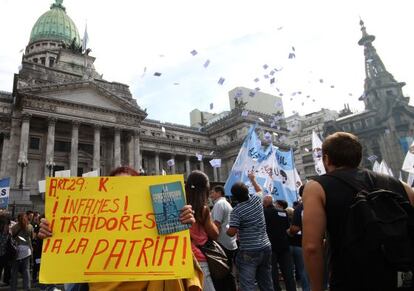Argentina’s Supreme Court throws out key part of government’s judicial reform
Ruling seen as a setback for president who vowed to restructure the judiciary


Argentina’s Supreme Court on Tuesday threw out the most important of six reforms presented earlier this year by President Cristina Fernández de Kirchner aimed at reforming the judiciary. The top court — made up of members who were named by the late President Néstor Kirchner during his 2003-2007 term — voted six to one to reject one of the reforms because it violated the nation’s Constitution.
The reform in question, which Fernández, Néstor Kirchner’s widow, said would “democratize the justice system,” called for the direct election by citizens of members of the nation’s top judiciary council, which appoints and removes judges across Argentina.
The majority of the nation’s judges had come out against the election of the so-called Magistrate Council and another proposal by the government to increase the watchdog’s membership from 13 to 19.
The Supreme Court also declared unconstitutional the plan to have political parties nominate their candidates to run for election to the council. In effect, the government will have to cancel the planned August 11 special election for the Magistrates Council.
Fernández had vowed to do away with “cronyism among judges”
The Supreme Court’s ruling against the core of Fernández de Kirchner’s judicial reform is seen as a major setback for the Argentinean president, who had vowed to do away with “cronyism among judges.” Those who had criticized the reform said that it violated the judiciary’s independence from the executive and legislative branches.
The ruling also marked another milestone in the volatile relationship between the Supreme Court and the government of Fernández de Kirchner.
In 2003 and 2004 Néstor Kirchner introduced measures to restructure the courts and end the lack of transparency. But the new, reformed Supreme Court had always maintained its independence. It ruled against the general amnesty afforded by President Carlos Menem to the members of the military dictatorship, which ruled the country from 1976 to 1983, as Kirchner wanted. But it has also ruled against the government in its drive to restructure pensions and has postponed for now a decision on Fernández’s controversial law aimed at breaking up media monopolies.
Nevertheless, the court must this year issue its ruling on the media law, which would require Grupo Clarín — the biggest media chain in Argentina and an enemy of the government — to give up most of its broadcast licenses.
Tu suscripción se está usando en otro dispositivo
¿Quieres añadir otro usuario a tu suscripción?
Si continúas leyendo en este dispositivo, no se podrá leer en el otro.
FlechaTu suscripción se está usando en otro dispositivo y solo puedes acceder a EL PAÍS desde un dispositivo a la vez.
Si quieres compartir tu cuenta, cambia tu suscripción a la modalidad Premium, así podrás añadir otro usuario. Cada uno accederá con su propia cuenta de email, lo que os permitirá personalizar vuestra experiencia en EL PAÍS.
¿Tienes una suscripción de empresa? Accede aquí para contratar más cuentas.
En el caso de no saber quién está usando tu cuenta, te recomendamos cambiar tu contraseña aquí.
Si decides continuar compartiendo tu cuenta, este mensaje se mostrará en tu dispositivo y en el de la otra persona que está usando tu cuenta de forma indefinida, afectando a tu experiencia de lectura. Puedes consultar aquí los términos y condiciones de la suscripción digital.








































